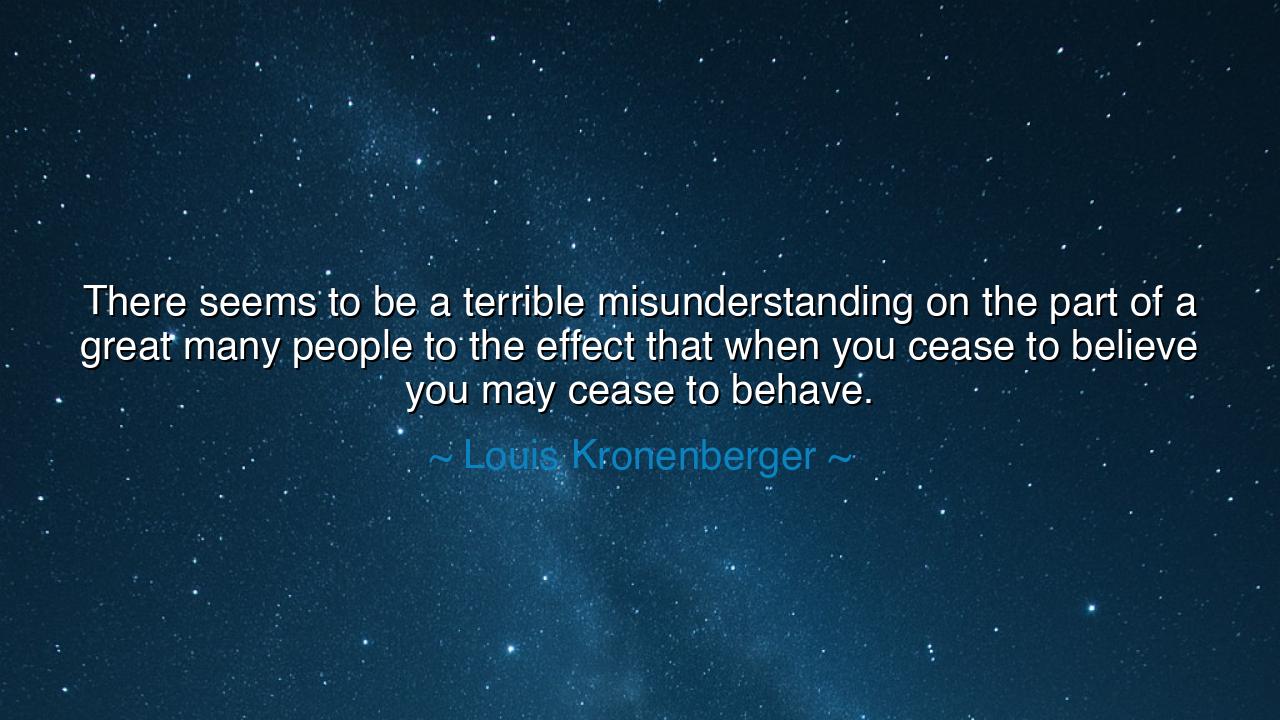
There seems to be a terrible misunderstanding on the part of a
There seems to be a terrible misunderstanding on the part of a great many people to the effect that when you cease to believe you may cease to behave.






“There seems to be a terrible misunderstanding on the part of a great many people to the effect that when you cease to believe you may cease to behave.” — Thus spoke Louis Kronenberger, the critic and moral observer of the twentieth century, who, with piercing intellect and quiet irony, unveiled a truth that cuts to the core of human nature. Beneath the subtle wit of this statement lies a warning both timeless and profound: that morality does not perish with belief, nor is virtue the exclusive property of faith. Kronenberger saw a world awakening from old religious certainties, but he feared that in throwing away the structures of belief, men might also cast aside the sacred responsibility to behave — to live with integrity, compassion, and honor.
The origin of this saying comes from Kronenberger’s reflections on modern civilization, an age in which doubt had replaced dogma and skepticism had dethroned faith. He observed that many, having lost belief in divine command or eternal reward, began to act as though morality itself were no longer binding. Yet he reminded them — and us — that conscience is not a relic of religion but the voice of human dignity. Even if one no longer believes in heaven, he must still strive to live honorably on earth. For the true measure of goodness is not what one professes, but how one behaves when there is no eye watching and no promise of reward.
To cease to believe is not, in itself, a failure. Belief may change; the mind may question, the soul may wander. But to cease to behave — to abandon compassion, honesty, and responsibility — is to fall into chaos. Kronenberger warns against this moral confusion, where the collapse of faith is mistaken for the freedom to indulge every whim. It is as if, freed from the fear of divine punishment, some men forget that the laws of goodness are written not only in scripture, but in the human heart. Civilization stands upon this silent code of conduct — the invisible covenant between souls that says, “Though I owe nothing to heaven, I owe everything to my fellow man.”
Consider the story of Socrates, the philosopher of Athens, who lived centuries before Christianity and its codes of salvation. He was not guided by dogma or the promise of divine reward, yet he lived — and died — by the dictates of conscience. When sentenced to death unjustly, he refused to flee, declaring that wrongdoing cannot be justified, even to save one’s life. Socrates believed in virtue for its own sake, in the purity of behavior unchained from belief in divine retribution. His life stands as an eternal answer to Kronenberger’s warning: that morality is not born of belief, but of understanding; not of fear, but of wisdom.
Kronenberger’s insight, however, also touches the opposite danger — that of hypocrisy. For many who proclaim belief behave no better, and sometimes worse, than those who profess none. Thus, he teaches that morality cannot depend on creed alone. True goodness is independent of theology, for it arises from empathy, reason, and love. To act justly should not require belief in reward; to show mercy should not depend on threat of punishment. The moral man, said the ancients, behaves rightly because he loves truth — not because he fears hell.
And yet, the loss of belief can be perilous when it leaves a void unfilled. For without faith in something — be it God, virtue, or humanity itself — the heart can grow cold. The wise do not cast away belief recklessly; they replace it with understanding, with reverence for life and for others. If one cannot believe in divine justice, then let him believe in human solidarity. If one cannot worship God, let him at least honor goodness. In this way, belief and behavior find harmony again, and the spirit remains upright though the heavens are silent.
Therefore, dear listener, take this wisdom to heart: whether you believe in God or not, you are bound by conscience. Do not mistake the freedom from belief for the freedom from duty. The universe may be vast and indifferent, but within you burns a light that knows right from wrong. Nurture it. Live honorably, speak truth, show mercy, even when no reward awaits. Let your goodness be self-sustaining — a flame that shines not for heaven’s praise, but because it is your nature to shine.
This, then, is the eternal meaning of Kronenberger’s words: that the fall of belief must never mean the fall of morality. For when belief fades, what remains to hold humanity together is behavior — the quiet, daily practice of decency and compassion. A man without belief may yet be virtuous; but a man without behavior is lost to himself and to the world. So let your life be proof that goodness needs no doctrine — only a heart that remembers what it means to be human.






AAdministratorAdministrator
Welcome, honored guests. Please leave a comment, we will respond soon